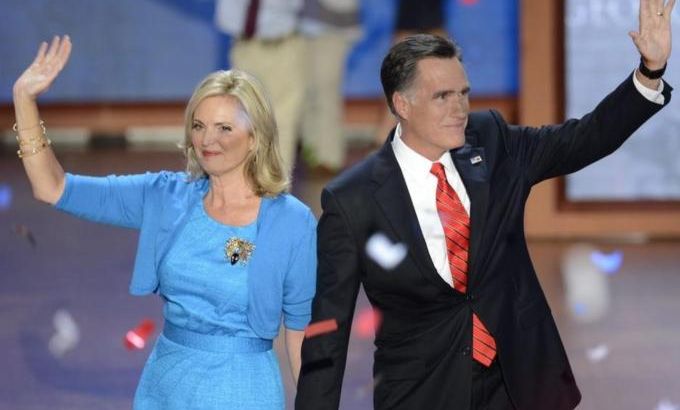Romney vows to ‘restore promise of America’
Republican candidate officially accepts GOP nomination in Tampa as he tries to convince voters he can fix US economy.

White House hopeful Mitt Romney spoke of the struggles of the working class, the importance of family life and American exceptionalism in a key speech aimed at winning the confidence of American voters.
As he accepted the Republican presidential nomination on Thursday night, the former Massachusetts governor said President Barack Obama had failed to deliver the “hope and change” he promised in 2008, and that many Americans had given up on the incumbent leader.
“It’s not just what we wanted, it’s not just what we expected, it’s what Americans deserved,” said Romney, 65.
He said that he would start his presidency with a “jobs tour” whereas Obama had started his with an “apology tour”.
“You know there’s something wrong with the kind of job he’s done as president when the best feeling you had was the day you voted for him,” said Romney.
“What is needed in our country today is not complicated or profound. It doesn’t take a special government commission to tell us what America needs,” he said.
He enumerated his business successes, including Bain Capital, saying that “In America, we celebrate success, we don’t apologise for success”.
Policies and promises
While he criticised what he said were Obama’s broken promises, Romney made plenty of his own.
|
Romney officially accepts GOP nomination |
He vowed to create 12 million jobs with a five-step plan, which includes making the US “energy independent by taking full advantage of our oil and coal and gas and nuclear and renewables”.
Other steps were jobs training, “forging new trade agreements”, securing the investments of entrepreneurs and becoming the “champion of small businesses”.
Romney said he would not raise taxes for the middle class, and that he would “protect the sanctity of life… honour the institution of marriage. And…guarantee America’s first liberty: the freedom of religion”.
Although Romney praised Obama for giving the order to assassinate Osama bin Laden, he also said the country is less secure because the president has not slowed Iran’s nuclear threat.
Sounding a hawkish tone, Romney told the GOP convention that Obama has said we should talk to Iran. Romney also is accusing Obama of throwing allies like Israel “under the bus” even as he relaxed sanctions on Cuba.
Trust factor
Romney, a multimillionaire who has has been criticised as being out of touch with the struggles of working class voters, spoke at length about the hardships facing Americans. He cited working two jobs, “doing with less”, worrying about gas prices and not being able to save money for the future.
Prior to Romney’s speech, political analyst Bill Schneider told Al Jazeera’s Alan Fisher that Romney’s biggest challenge rests in getting “people to trust him, to believe him when he says, ‘I can turn this economy around”.
“He’s got to convey that impression – ‘I’m a success. I can build it. Trust me,'” said Schneider.
Earlier, actor and director Clint Eastwood and Florida Senator Marco Rubio gave rousing introductory speeches to a packed house.
Both speakers took shots at Obama’s handling of the economy.
Eastwood criticised Obama for failing to turn the economy around and for failing to deliver on his promises. He said it is time for Romney and his running mate, Paul Ryan, to take over.
Hollywood star Eastwood raised eyebrows with an off-the-cuff monologue to an imaginary Obama in an empty chair.
Referring to the president, Eastwood told a rapturous audience: “When somebody does not do the job, you’ve got to let ’em go.”
Rubio, meanwhile, told the GOP convention that Romney understands prosperity does not happen because the government spends more money, but because people using their own money to open businesses.
Faith questioned
Romney, the first Mormon presidential candidate on a major party ticket, also briefly touched on his faith after years of avoiding any direct mention of his religion.
He spoke of his family finding “kinship” at church, placing importance on the community it provided, although he did not dwell on his Mormon faith.
In a nation where eight-in-10 people identify themselves as religious, Romney must convince the public that his Mormonism will not have a negative impact on his leadership.
With a July poll stating that nearly one-in-four Christian Evangelical Protestants saying they are uncomfortable with a Mormon president, Romney will also have to convince the US electorate that his faith will not alienate him from more mainstream voters.
Romney’s elevation to official challenger to Obama in the November 6 election comes more than five years after he launched his first White House bid.
Experts a presidential race which is neck-and neck and dependent on a handful of key states.